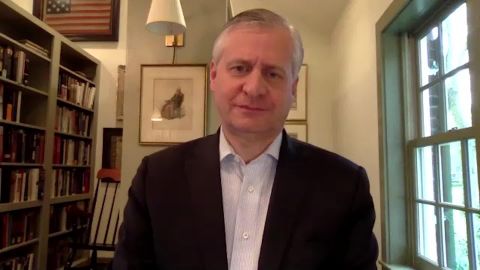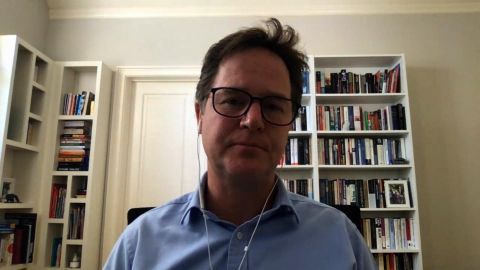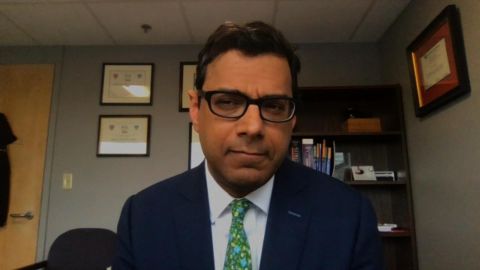Read Transcript EXPAND
CHRISTIANE AMANPOUR: How they tackle coronavirus will shape the legacies of today’s leaders. How are they stacking up, though, against presidents and prime ministers of yesteryear? We get some perspective with our next guest, the Pulitzer prize-winning historian and presidential biographer, Jon Meacham in a candid conversation. With our Walter Isaacson, he dissects the performance of President Trump in this crisis and they discuss sacrifice, and Meacham’s latest book “The Hope of Glory.”
WALTER ISAACSON: Jon Meacham, welcome to the show.
JON MEACHAM, AUTHOR, “THE HOPE OF GLORY”: Thanks, Walter.
ISAACSON: Jon, give us some perspective on the coronavirus crisis. When has our nation been tested this way, and how did we respond?
MEACHAM: Really, we haven’t been. It is a unique moment. The flu pandemic of 1918 has been widely discussed. John Barry, your colleague, has written wonderfully about it. I think this is more like — because of the modern era, because of globalization, this is more like a war situation where all of us are combatants. It is as if we were in London in 1940 during the Battle of Britain. And to some extent, it’s even more insidious because of the infectious nature of the crisis.
ISAACSON: Your biographies are great lessons in leadership. What do we have to learn? Let’s start with Franklin Roosevelt.
MEACHAM: The key thing about FDR, I think, is, he was as straightforward as we could be in terms of public leadership. He had a few moments in the run-up to World War II where he was not. But if you go back to 1933, when — some people think 40 percent of the country was unemployed. The number was 25. But it’s hard to figure out. He laid it out, right? He said, we have nothing to fear but fear itself, which is the great line we all remember. But the line that got the biggest cheer that day was when he said, “I might require executive powers to act as if we had been invaded by a foreign foe.” And the crowd roared. Mrs. Roosevelt wrote that that chilled her to the bone, because she worried that people were ready for a dictator. But he was straightforward. He said during the war, the news is going to get worse and worse before it gets better and better, and the American people deserve to have it straight from the shoulder. He learned some of that from Winston Churchill, who said wonderfully that the British people can face any misfortune with fortitude and buoyancy, right, Churchill goes, fortitude and buoyancy, as long as they are convinced that those who are in charge of their affairs are not deceiving them or are not themselves dwelling in a fool’s paradise. Interesting two-prong test, right? We want to make sure they’re not deceiving us, they’re not lying to us, and they’re not dwelling in a fool’s paradise, they’re not lying to themselves.
ISAACSON: Expand on that. You talk about candor. You talk about not deceiving us. You talk about living in a fool’s paradise. Where has Trump sort of gone on the wrong side of those leadership…
(CROSSTALK)
MEACHAM: Well, he — I think we look at the history of statements when this first emerged, right? It’s all been — it’s going to be a miracle. It’s all going to disappear. We have 15, it’s going to go down. And then the capacity — to me, what’s so fascinating and the other thing that FDR said, famously remember, was, we have to have a spirit of bold, persistent experimentation. Try a method, and, if it fails, admit it frankly and try another. But, above all, try something. President Trump, if you just watch these press conferences — which is kind of like a car wreck, you got to watch, right? The endless need, the insatiable need to justify and rewrite the immediate past to make himself look better is overwhelming. He won’t acknowledge that any mistake was made. And so, therefore, he’s always right. And the problem with that is that all of us know at some level that nobody is perfect. We all know. Presidents of the United States who get in trouble are the ones who don’t level with us, right, Johnson in Vietnam, Nixon in damn near everything. We know — he you just look at the tape. He was wrong. It’s OK. The point is, we have to look forward. We have to move forward. So say you were wrong and push forward. And the person who did that better than anybody was John Kennedy. After the Bay of Pigs, he said, in a parliamentary system, I’d have to resign. So what does he do? He reaches out to Eisenhower, remember? Ike comes over from Gettysburg. They meet at Camp David. He talks through this. Kennedy was 44 years old, 43 years old at that point. He was trying to learn how to be president. And you cut to the Cuban Missile Crisis. We came through that not least because Kennedy had had the capacity to admit he made a mistake and to learn from it.
ISAACSON: You have written a magisterial book on George H.W. Bush, and you knew him. What would he be thinking at a time like this and urging us to do?
MEACHAM: He believed so strongly in the basic constitutional system that, at the age of 18, he signed up — on his 18th birthday, he signed up to go defend. In the depths of Watergate, he wrote his kids a letter. He was chairman of the Republican National Committee. He wrote them about how important it was to make the system work. And so he would be deferring to experts. Bush loved listening to the experts, because — and he would reach out to mid-levels of the NSC, to the mid-levels of the CIA. He would ask them to come in, because he knew there was an immense amount of expertise there. So he would follow the facts, and he would believe ultimately in the system.
ISAACSON: If you go back to the Civil War in 1864, the country was as probably in bad of shape as it is now, even worse. And yet Abraham Lincoln, who thought he might lose the election, goes ahead with the election of 1864 and makes sure that people understand that, if he loses, they will transfer power to the person, McClellan, who actually wanted to stop the Civil War and perhaps let the nation be divided.
MEACHAM: I think there’s a great case to be made that that moment is the one where we knew finally that America would endure, because it’s — to imagine a commander in chief of a nation in — facing an armed insurrection. Where else in the world would he put his fate in the hands of voters and acknowledge and say that he was going to take it? So, when you’re looking for a moment where, at what point was it pretty clear that this experiment would last, I think 1864 is a good candidate.
ISAACSON: You have written this fascinating book that’s just come out about Jesus’ words on the cross. Why, in this Lenten season, as we head towards Good Friday, should we be thinking about what Jesus said on that Friday?
MEACHAM: Well, it’s the hinge of history in many ways. as you know. The West is oriented around the Judeo-Christian story, the question of ancient — the story of ancient Israel and the outgrowth of Christianity in the — after the first century. So, to me, anything that determines how we tell time is intrinsically worth paying attention to. My own view — I’m an Episcopalian, so we count as Christians, but only barely. We have to reengage with that story, in order to understand who we are, and in many ways who we ought to be.
ISAACSON: When you reflect on Lent, and what we sacrifice for Lent — and somebody down here in New Orleans said, we give up things for Lent, but I’m not ever given up this much.
MEACHAM: Right.
ISAACSON: Do you think this notion of sacrifice that we’re facing now during this Lenten season will cause us to reflect more?
MEACHAM: I hope so. I — one of the things we have been discussing in our house is one of the frustrations about the current crisis is, it’s so hard outside of — if you’re not a doctor, outside of sharing your means, it’s very hard to go out and help people. There’s this great instinct, right? And it’s a great human and American instinct to help the least of these. And because of the nature, the insidious nature of an infectious disease, it’s hard to do. So, absolutely. To me, the central part of bad drama on Good Friday is when he says, son, behold thy mother, mother, behold thy son. He’s saying it to John, the disciple. He’s trying to arrange things. He understands that it’s cataclysmic. And the sense that we are here for each other, and the best we can do to make the earthly kingdom like this ideal kingdom is our profound duty.
ISAACSON: One of the doctrines that you write about in your book “Hope of Glory,” is this notion of empathy, this notion of that which you do to the least of us. How is that something that you feel President Trump and his movement have perverted?
MEACHAM: Well, we have children in cages at the border, right? We have a rhetoric of members of, Congress should go home, when home is their district, not their family’s country of origin. Leave aside the religious part. America has always been stronger when we have not been isolationist, when we haven’t built walls, when we have opened our arms and opened our hearts. And that may sound sentimental and all that, but it’s not. It’s a simple fact. Our apex of power, would you agree, was probably 1964-’65, right? And what is — what characterizes that? What characterized it was the implications of World War II, which helped fuel the civil rights movement. Slowly, but surely, women were brought more into the mainstream of American life. By 1965, President Johnson had signed an immigration act to undo the 1924 restrictive act, a 1924 act which had kept us from receiving refugees from Nazi Germany in the late 1930s. There was this moment of openness. And in 1964-’65 — I think I’m right about this — that was the highest number Gallup ever found of faith in the government to do the right thing some or most of the time. It was something like 77 percent. That number is now down around 12 percent. And so what — you have to look, what characterized that? Well, what characterized it was, we are, in fact, one nation, indivisible. We are, in fact, stronger because of our diversity. And, fundamentally, yes, that’s an American virtue, yes, it’s a secular virtue, but it’s also a religious one.
ISAACSON: I have known you, Jon, for almost going on 40 years now.
MEACHAM: Yes.
(LAUGHTER)
ISAACSON: It’s hard to think we’re that old. And I have never known your political orientation. I have never known whether you felt more of a Republican or a Democrat.
MEACHAM: Yes.
ISAACSON: And yet right now, you said you would favor Joe Biden because he has certain character traits. Explain to me why you came to that conclusion.
MEACHAM: I think that we are seeing, in the most elemental way, the significance and relevance of a fact-based, enlightenment-driven, empathetic presidency of the United States. I wrote the piece about Vice President Biden because it seemed to me that, at a certain point, if you have any claim on people’s attention, however minor, you have a moral obligation to say what you think. And I believe that, as we read more and more of these reconstructions, as we look at more and more of what we used to call the ticktocks, we will see that the Trump administration, because of the character of the person at the top, created a reality distortion field that slowed and warped a response that is going to kill more people than the Vietnam War did. And in that case, given those stakes, and if there’s a choice at hand, I don’t mind saying who my choice would be.
ISAACSON: Given the many missteps in the mishandling of this crisis that have led us to where we are today, why hasn’t there been more of a hit on President Trump’s approval ratings?
MEACHAM: I think I accept the conventional explanation that you rally around the president in a crisis. President Carter, same thing happened with the hostage crisis. I also think it’s a reflection of the divided nature of the country. We are living through not only a rare pandemic, but perhaps our first partisan pandemic. Our partisanship is now part of the air we breathe. It is — there’s a vanishingly small number of people who are reachable by data, fact and argument. And I think that — I bet you, by the end of this, at least at some point, basically, the president’s approval ratings on the crisis will end up falling into a very traditional pattern over the last three years.
ISAACSON: I think people would have been appalled a few years ago or a few decades ago to think that even a pandemic would have a partisan response. Even the facts would be viewed in a partisan way, like how many people might get it would be considered a partisan argument. How did we get here so that even pandemics are viewed in a partisan way? And how do we get out of this?
MEACHAM: I think what we’re living in is the great test of whether the enlightenment lives, right? The enlightenment was about, you follow reason, data, contrary fact, and you reach conclusions based on reality, not preexisting theological views, right? I mean, that’s the basic definition. Interestingly, our partisanship has become almost a religion for us, right? We have our own prophets. We have our own martyrs. We have our own holy books. Some people have written about this. It’s a great sociological insight. And I think, to some extent, I mean, for all the obvious reasons, the media, the partisanization of the media, all that, but there’s something in the human spirit, there’s something in the human condition that appreciates certitude and rushes to embracing almost a kind of fundamentalism. It’s easier. If you pick a team and you don’t have to think anymore, that’s easier than having to think and then figure out which team is closest to what you think. It may be — here’s an overly grand point. It may be that the enlightenment era, the Lockean era of thoughtful republican democracy may be the exception, and not the rule. I mean, maybe we — maybe the last 300 years or so will end up being a different chapter, as opposed to an ongoing one. I hope not. But that’s not unlike — that’s not impossible.
ISAACSON: Jon Meacham, thank you for being with us this evening.
MEACHAM: Thanks, Walter.
About This Episode EXPAND
Dr. Atul Gawande joins Christiane Amanpour to reflect on another week of tragedies and challenges. Nick Clegg, VP for global affairs and communications at Facebook, discusses the spread of false and dangerous information. Presidential historian Jon Meacham dissects the performance of President Trump in the COVID-19 crisis. David Beasley discuses his experience falling ill with the virus.
LEARN MORE



